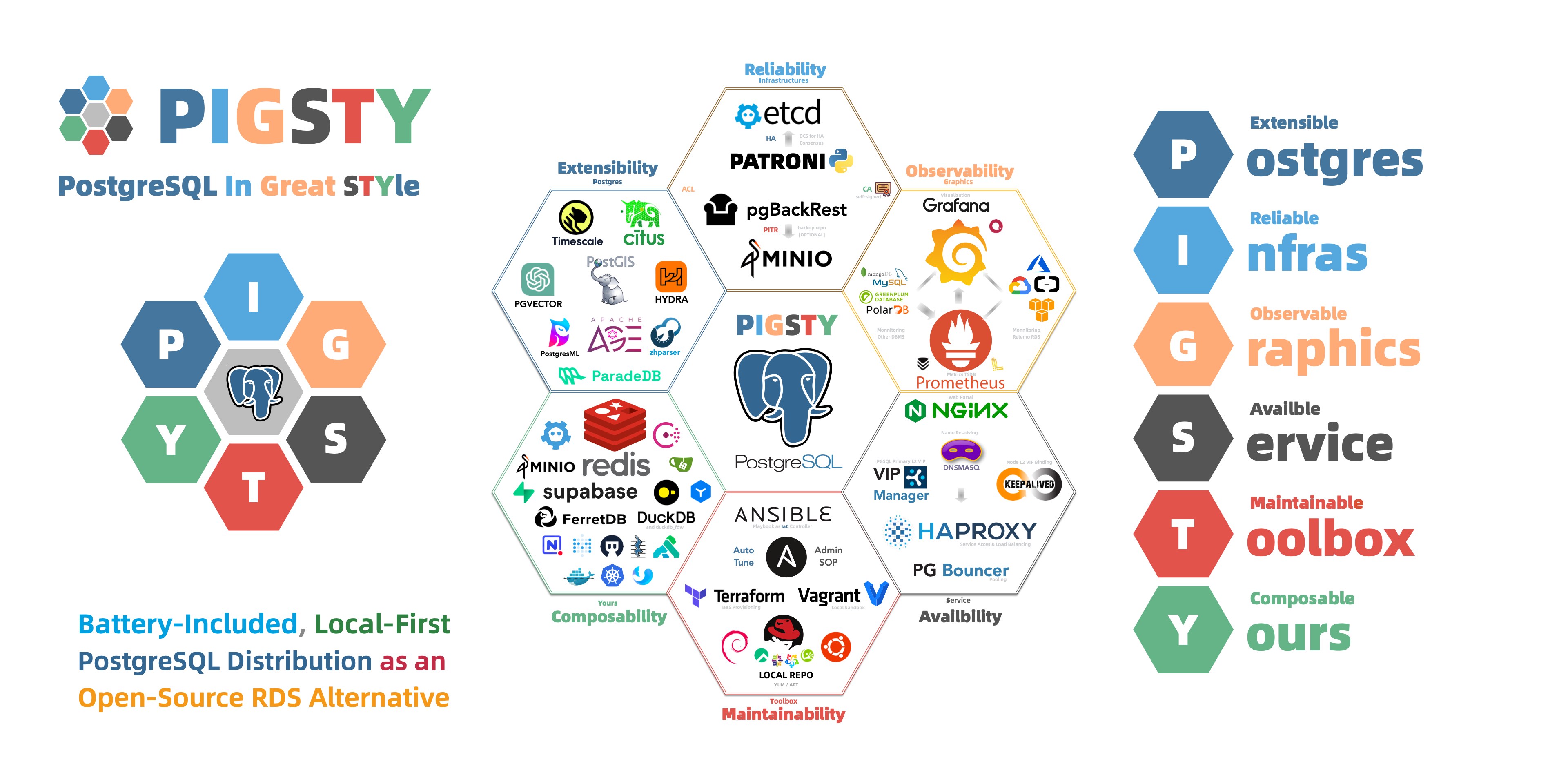-
Notifications
You must be signed in to change notification settings - Fork 271
Home
Battery-Included, Local-First PostgreSQL Distribution as an Free & Better RDS Alternative!
"PostgreSQL In Great STYle": Postgres, Infras, Graphics, Service, Toolbox, it's all Yours.
Features | Website | Docs | Demo | Blog | Discuss | Roadmap | 中文站 | 专业版 | 博客 | 特性
Get Started with the latest v3.0.1 release: curl -fsSL https://repo.pigsty.io/get | bash
- Extensible: 335 PG Extensions & 6 PG Kernel replacements available (e.g., MSSQL, Oracle compatibility).
- Reliable: Self-healing HA clusters with pre-configured PITR and built-in ACL, CA & SSL secure best practice.
- Observable: SOTA monitoring for PG / Infra / Node based on Prometheus & Grafana stack: Demo & Gallery.
- Available: Auto-routed & pooled customizable database Services Access with haproxy, pgbouncer, and VIP.
- Maintainable: One-Cmd Install, Admin SOP, Auto-Tune, Local Repo, IaC and Vagrant / Terraform support.
- Composable: Bonus Modules such as Redis, MinIO, Etcd, Docker, DuckDB, FerretDB, Supabase, & more!
- Unparalleled Extension: We packed 135 RPM and 133 DEB extensions in addition to the official PGDG repo.
- Stunning Observability: Ultimate experience with 3000+ metrics visualized in 30+ organized dashboards.
- Reliable Best Practices: Proven & Polished in large-scale production environment (25K vCPU) for 5 years+.
- NO Docker/Kubernetes: We choose the hard way to deliver RDS based on bare OS WITHOUT Containers!
- Infrastructure as Code: Describe everything with declarative API and provision with idempotent playbooks!
- Free OSS & Local-First: Pigsty is a free software under AGPLv3. Build for PostgreSQL with passion & love.
- Full Control: Unleash the full power of PostgreSQL with 335+ extensions, and gain full control of your data!
- Rest Assured: Self-healing HA from hardware failures and Point-In-Time-Recovery from human error & bugs!
- Keen Insight: You can't manage what you can't measure. Gain penetrating insight through all-seeing panels!
- Self-Reliant: Self-serving enterprise RDS service with all its dependencies in the absence of a dedicated DBA!
- Anti-Entropy: Describe everything in code, minimize complexity with IaC & SOP, Administration with GitOps!
- Get more, Pay less: No vendor lock-in, Run your own RDS to reclaim 90%+ hardware bonus from the Cloud!
Prepare a fresh x86_64 node that runs any compatible Linux OS Distros, then Download Pigsty with:
curl -fsSL https://repo.pigsty.io/get | bash; cd ~/pigsty;Next, bootstrap, configure, and run the install.yml playbook with an admin user (nopass ssh & sudo):
./bootstrap; ./configure; ./install.yml;Finally, you will get a pigsty singleton node ready, with Web service on port 80/443 and Postgres on port 5432.
Install with get script
$ curl -fsSL https://repo.pigsty.io/get | bash
[v3.0.1] ===========================================
$ curl -fsSL https://repo.pigsty.io/get | bash
[Site] https://pigsty.io
[Demo] https://demo.pigsty.cc
[Repo] https://github.com/Vonng/pigsty
[Docs] https://pigsty.io/docs/setup/install
[Download] ===========================================
[ OK ] version = v3.0.1 (from default)
curl -fSL https://repo.pigsty.io/src/pigsty-v3.0.1.tgz -o /tmp/pigsty-v3.0.1.tgz
######################################################################## 100.0%
[ OK ] md5sums = xxxxxxxxxxxxxxxxxxxxxxxxxxxxxxxxxxxxxxx /tmp/pigsty-v3.0.1.tgz
[Install] ===========================================
[WARN] os user = root , it's recommended to install as a sudo-able admin
[ OK ] install = /root/pigsty, from /tmp/pigsty-v3.0.1.tgz
[TodoList] ===========================================
cd /root/pigsty
./bootstrap # [OPTIONAL] install ansible & use offline package
./configure # [OPTIONAL] preflight-check and config generation
./install.yml # install pigsty modules according to your config.
[Complete] ===========================================
HINT: To install a specific version, pass the version string as the first parameter:
curl -fsSL https://repo.pigsty.io/get | bash -s v3.0.1
Or clone src with git
You can also download the pigsty source with git, remember to check out a specific version tag, the main branch is for development.
git clone https://github.com/Vonng/pigsty; cd pigsty; git checkout v3.0.1Example: Singleton Installation on RockyLinux 9.3:
Pigsty uses a modular design. There are 4 CORE modules available by default:




You can compose them freely in a declarative manner. INFRA & NODE will suffice for host monitoring.
ETCD and PGSQL are used for HA PG clusters; Installing them on multiple nodes automatically forms HA clusters.
The default install.yml playbook will install INFRA, NODE, ETCD & PGSQL on the current node.
Which gives you an out-of-the-box PostgreSQL singleton instance (admin_ip:5432) with everything ready.
The node can be used as an admin controller to deploy & monitor more nodes & clusters. For example, you can install these 4 OPTIONAL extended modules for advanced use cases:

PGSQL.



Of course, you can deploy different kinds of HA PostgreSQL clusters on multiple nodes, as much as you want.















